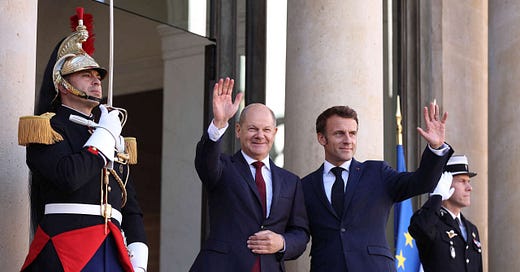Can't you just get along?! Why Germany and France disagree on so many issues
Why did Emmanuel Macron and Olaf Scholz convene on a "couple therapy"? And was it successful to mend the open wounds between the french and german governments?

Yesterday was the occasion for Emmanuel Macron and Olaf Scholz to discuss, face to face, the issues that brought them apart for the last month. In the meeting that lasted for more than three hours, the two men made an effort to mend the increasing gap that stands between their two respective nations.
France and Germany have been bickering with each other since the start of the war in Ukraine, in what is dubbed by some specialists as a major failure of the Franco-German engine of the European Union.
After the cancelation of the Franco-German ministerial council that should have taken place yesterday, President Macron and Chancellor Scholz decided to meet and redefine "relations between France and Germany [...] by making a reset on a number of points," according to the French minister Bruno Le Maire.
The grape of discord
Energy disagreements
France and Germany are in different leagues when it comes to energy measures at the European level. For starters, many in France see Germany responsible—in parts—for the gigantic dependency of Europe on Russian gas at the start of the conflict in Ukraine.
On the strategy to adopt, France promotes a cap on gas prices, while Germany, with its seemingly bottomless pockets, is against it. Last week, Emmanuel Macron negotiated with Spain and Portugal the abandonment of the MidCat pipeline in favor of a connection of the Iberian peninsula to Marseille, without consideration for Germany, a partner in the initial project.
Defense
When he arrived in power in 2017, Emmanuel Macron pledged to advance the strategic autonomy of Europe. Several decisions by Olaf Scholz, encouraged by the conflict at the Union’s border, set back the project a few years back.
In terms of defence, and after decades of under-investment, Germany has also made a 180 degree turn to make its army "the best equipped force in Europe". Here again, without necessarily working towards the reinforcement of European strategic autonomy advocated by Paris and even less towards Franco-German military-industrial cooperation. - translated from Les Echos
A successful “couple therapy”?
That’s how Politico’s Playbook newsletter described yesterday’s meeting.
The good news is that German Chancellor Olaf Scholz and French President Emmanuel Macron are still talking to each other … for almost three and a half hours on Wednesday, an hour longer than planned. - Politico
Both leaders agreed that France and Germany, due to recent policies, are now closer than they ever have been. France’s economic reforms under Emmanuel Macron drew inspiration from its neighbor, and the latter’s “Zeitenwende” shift aligns it with France’s proposals on foreign policy and defense.
The ministers’ council should resume soon, and it seems that yesterday’s discussion permitted to clarify several points between France and Germany. Yet, it remains to be seen how this translates into concrete proposals.





